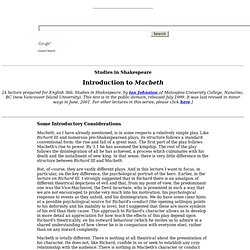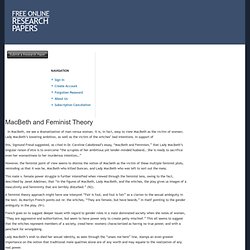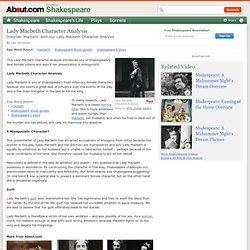

Macbeth and the Witches by Lauren Morbey on Prezi. Video - Power and control. Lecture on Macbeth. Studies in Shakespeare Introduction to Macbeth [A lecture prepared for English 366: Studies in Shakespeare, by Ian Johnston of Malaspina-University College, Nanaimo, BC (now Vancouver Island University).

This text is in the public domain, released July 1999. It was last revised in minor ways in June, 2001. For other lectures in this series, please click here.] Some Introductory Considerations. Smith. Macbeth. Manhood and masculine identity in ... - Maria L. Howell. Free College Essays.com - Free Essays, Term Papers and Book Reports. The Madness of Macbeth. As Macbeth matures there are times when his masculinity is put to the test and times when it is questioned.
At first Macbeth follows a code of honor, loyalty, and patriotism to his country, displaying masculine behavior through his violent deeds. Heavily influenced by his wife, Lady Macbeth, Macbeth’s view on what makes a real man begins to change. As corrupt desires of power and greed take hold, Macbeth is clouded by his own blind desires and ambitions. Macbeth’s downfall is complimented by his changing views on masculinity, and how it is presented through ambition, morals, patriotism, gender, and ultimately violence. Ambition is a quality that no man lacks, as all men have their ambitions. Macbeth’s journey takes a dark turn when his once high morals begin to decay. Ay, in the catalogue ye go for men, As hounds and greyhounds, mongrels, spaniels, curs, Shoughs, water-rugs and demi-wolves, are clept All by the name of dogs. (3.1.102-107) MacBeth and Feminist Theory. In MacBeth, we see a dramatization of man versus woman.

It is, in fact, easy to view MacBeth as the victim of women; Lady MacBeth’s towering ambition, as well as the victim of the witches’ bad intentions. In support of this, Sigmund Freud suggested, as cited in Dr. Caroline Cakebread’s essay, “MacBeth and Feminism,” that Lady MacBeth’s singular raison d’etre is to overcome “the scruples of her ambitious yet tender-minded husband… She is ready to sacrifice even her womanliness to her murderous intention…” However, the feminist point of view seems to dismiss the notion of Macbeth as the victim of these multiple feminist plots, reminding us that it was he, MacBeth who killed Duncan, and Lady MacBeth who was left to sort out the mess.
A feminist theory approach might have one interpret “Fair is foul, and foul is fair” as a clarion to the sexual ambiguity in the text. In the end, women are removed from any position of power in the tale. Works Cited Adelman, Janet. Chomsky, Noam. Gender Dynamics in Shakespeare's Macbeth and the Taming of the Shrew. “Unsex Me Here”: Gonoril, Lady Macbeth and issues of gender and power in King Lear and Macbeth « The only stupid thing about words is the spelling of them. Shakespeare’s use of female characters in the tragedies modifies and develops like the tragedies themselves.
From Romeo and Juliet to Macbeth, Shakespeare has cultivated his tragic form while also exploring his tragic hero/heroine. There is a doubling in the tragic characters: just has Romeo and Juliet can be interpreted as one tragic hero, so too can Macbeth and Lady Macbeth. In King Lear, Regan and Gonoril function almost as one entity as well, though not as the tragic hero/heroine, but as the anti-hero/heroine. While analyzing the apparently stronger of the two sisters, Gonoril, then comparing her to Lady Macbeth, many similarities arise. As Shakespeare worked within the tragic genre, he created Gonoril’s character as unsympathetic, and sympathy is one of the main ingredients in a tragic hero/heroine. A study of the character of Gonoril from King Lear would be a good place to start. Regan: We shall further think on’t.
Goneril: We must do something, and i’th’heat (1.1. 295-296). Lady Macbeth Character Analysis - Discover ‘Macbeth’ with our Lady Macbeth Character Analysis. This Lady Macbeth character analysis introduces one of Shakespeare’s best female villains and asks if her presentation is misogynistic.

Lady Macbeth Character Analysis Lady Macbeth is one of Shakespeare’s most infamous female characters because she exerts a great deal of influence over the events of the play and is the main instigator in the plot to kill the king. In many respects, Lady Macbeth is a classic femme fatal. She is more ambitious and power hungry than Macbeth, her husband, and when he tries to back out of the murder she has plotted, she calls his manhood into question. A Misogynistic Character? This presentation of Lady Macbeth has attracted accusations of misogyny from critics because the women in the play (Lady Macbeth and the witches) are manipulative and evil. Masculinity is defined in the play by ambition and power – two qualities that Lady Macbeth possesses in abundance. Guilt.